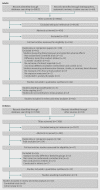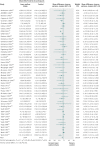Effect of lower sodium intake on health: systematic review and meta-analyses - PubMed (original) (raw)
Review
Effect of lower sodium intake on health: systematic review and meta-analyses
Nancy J Aburto et al. BMJ. 2013.
Abstract
Objective: To assess the effect of decreased sodium intake on blood pressure, related cardiovascular diseases, and potential adverse effects such as changes in blood lipids, catecholamine levels, and renal function.
Design: Systematic review and meta-analysis.
Data sources: Cochrane Central Register of Controlled Trials, Medline, Embase, WHO International Clinical Trials Registry Platform, the Latin American and Caribbean health science literature database, and the reference lists of previous reviews.
Study selection: Randomised controlled trials and prospective cohort studies in non-acutely ill adults and children assessing the relations between sodium intake and blood pressure, renal function, blood lipids, and catecholamine levels, and in non-acutely ill adults all cause mortality, cardiovascular disease, stroke, and coronary heart disease.
Study appraisal and synthesis: Potential studies were screened independently and in duplicate and study characteristics and outcomes extracted. When possible we conducted a meta-analysis to estimate the effect of lower sodium intake using the inverse variance method and a random effects model. We present results as mean differences or risk ratios, with 95% confidence intervals.
Results: We included 14 cohort studies and five randomised controlled trials reporting all cause mortality, cardiovascular disease, stroke, or coronary heart disease; and 37 randomised controlled trials measuring blood pressure, renal function, blood lipids, and catecholamine levels in adults. Nine controlled trials and one cohort study in children reporting on blood pressure were also included. In adults a reduction in sodium intake significantly reduced resting systolic blood pressure by 3.39 mm Hg (95% confidence interval 2.46 to 4.31) and resting diastolic blood pressure by 1.54 mm Hg (0.98 to 2.11). When sodium intake was <2 g/day versus ≥ 2 g/day, systolic blood pressure was reduced by 3.47 mm Hg (0.76 to 6.18) and diastolic blood pressure by 1.81 mm Hg (0.54 to 3.08). Decreased sodium intake had no significant adverse effect on blood lipids, catecholamine levels, or renal function in adults (P>0.05). There were insufficient randomised controlled trials to assess the effects of reduced sodium intake on mortality and morbidity. The associations in cohort studies between sodium intake and all cause mortality, incident fatal and non-fatal cardiovascular disease, and coronary heart disease were non-significant (P>0.05). Increased sodium intake was associated with an increased risk of stroke (risk ratio 1.24, 95% confidence interval 1.08 to 1.43), stroke mortality (1.63, 1.27 to 2.10), and coronary heart disease mortality (1.32, 1.13 to 1.53). In children, a reduction in sodium intake significantly reduced systolic blood pressure by 0.84 mm Hg (0.25 to 1.43) and diastolic blood pressure by 0.87 mm Hg (0.14 to 1.60).
Conclusions: High quality evidence in non-acutely ill adults shows that reduced sodium intake reduces blood pressure and has no adverse effect on blood lipids, catecholamine levels, or renal function, and moderate quality evidence in children shows that a reduction in sodium intake reduces blood pressure. Lower sodium intake is also associated with a reduced risk of stroke and fatal coronary heart disease in adults. The totality of evidence suggests that most people will likely benefit from reducing sodium intake.
Conflict of interest statement
Competing interests: All authors have completed the ICMJE uniform disclosure form at www.icmje.org/coi\_disclosure.pdf (available on request from the corresponding author) and declare: LH, FPC, PE, and JJM received funding from WHO to attend NUGAG Subgroup of Diet and Health meetings, PE receives support from the National Institute for Health Research Biomedical Research Centre based at Imperial College Healthcare NHS Trust and Imperial College London, FPC is an unpaid member of Consensus Action on Salt and Health (CASH), World Action on Salt and Health (WASH), unpaid advisor to the WHO and the PAHO, a member of the National Heart Forum and former member of the executive committee and trustee of the British Hypertension Society, PE is an unpaid member of CASH, WASH, and an unpaid advisor to WHO; no further financial support from any organisation for the submitted work that might have an interest in the submitted work in the previous three years; no other relationships or activities that could appear to have influenced the submitted work. NJA was a staff member of WHO at the time this work was conducted. The author alone is responsible for the views expressed in this publication and they do not necessarily represent the views, decisions, or policies of WHO.
Figures
Fig 1 Flow of records in adults and children
Fig 2 Effect of reduced sodium intake on resting systolic blood pressure in adults
Fig 3 Direct comparisons of effect of sodium consumption of <2 g/day _v_ >2g/day, <1.2 g/day _v_ >1.2 g/day, and a reduction by one third or more versus less than one third relative to control on systolic blood pressure in adults
Fig 4 Effect of reduced sodium intake on resting systolic blood pressure in children
Comment in
- The (political) science of salt revisited.
Graudal N, Jürgens G. Graudal N, et al. BMJ. 2013 May 3;346:f2741. doi: 10.1136/bmj.f2741. BMJ. 2013. PMID: 23645896 No abstract available. - [Reduction in blood pressure: lower sodium and increased potassium intake?--Known facts now once more scientifically strengthened].
Zidek W. Zidek W. Dtsch Med Wochenschr. 2013 May;138(22):1152. doi: 10.1055/s-0032-1329049. Epub 2013 May 22. Dtsch Med Wochenschr. 2013. PMID: 23700300 German. No abstract available. - Public health: Effects of sodium and potassium intake on health outcomes.
Chang A, Appel LJ. Chang A, et al. Nat Rev Nephrol. 2013 Jul;9(7):376-7. doi: 10.1038/nrneph.2013.107. Epub 2013 Jun 11. Nat Rev Nephrol. 2013. PMID: 23752886 No abstract available. - Lower sodium intake reduces blood pressure in adults and children, but is not associated with a reduced risk of all CVD or all cause mortality.
Alderman MH, Cohen H. Alderman MH, et al. Evid Based Med. 2014 Feb;19(1):33-4. doi: 10.1136/eb-2013-101385. Epub 2013 Jul 19. Evid Based Med. 2014. PMID: 23873817 No abstract available.
Similar articles
- Effect of increased potassium intake on cardiovascular risk factors and disease: systematic review and meta-analyses.
Aburto NJ, Hanson S, Gutierrez H, Hooper L, Elliott P, Cappuccio FP. Aburto NJ, et al. BMJ. 2013 Apr 3;346:f1378. doi: 10.1136/bmj.f1378. BMJ. 2013. PMID: 23558164 Free PMC article. Review. - Replacing salt with low-sodium salt substitutes (LSSS) for cardiovascular health in adults, children and pregnant women.
Brand A, Visser ME, Schoonees A, Naude CE. Brand A, et al. Cochrane Database Syst Rev. 2022 Aug 10;8(8):CD015207. doi: 10.1002/14651858.CD015207. Cochrane Database Syst Rev. 2022. PMID: 35944931 Free PMC article. Review. - Sodium and Potassium Intake: Effects on Chronic Disease Outcomes and Risks [Internet].
Newberry SJ, Chung M, Anderson CAM, Chen C, Fu Z, Tang A, Zhao N, Booth M, Marks J, Hollands S, Motala A, Larkin J, Shanman R, Hempel S. Newberry SJ, et al. Rockville (MD): Agency for Healthcare Research and Quality (US); 2018 Jun. Report No.: 18-EHC009-EF. Rockville (MD): Agency for Healthcare Research and Quality (US); 2018 Jun. Report No.: 18-EHC009-EF. PMID: 30125063 Free Books & Documents. Review. - Folic acid supplementation and malaria susceptibility and severity among people taking antifolate antimalarial drugs in endemic areas.
Crider K, Williams J, Qi YP, Gutman J, Yeung L, Mai C, Finkelstain J, Mehta S, Pons-Duran C, Menéndez C, Moraleda C, Rogers L, Daniels K, Green P. Crider K, et al. Cochrane Database Syst Rev. 2022 Feb 1;2(2022):CD014217. doi: 10.1002/14651858.CD014217. Cochrane Database Syst Rev. 2022. PMID: 36321557 Free PMC article.
Cited by
- Dietary Salt Restriction and Adherence to the Mediterranean Diet: A Single Way to Reduce Cardiovascular Risk?
D'Elia L, Strazzullo P. D'Elia L, et al. J Clin Med. 2024 Jan 16;13(2):486. doi: 10.3390/jcm13020486. J Clin Med. 2024. PMID: 38256620 Free PMC article. Review. - Mean population salt intake in Iran: A systematic review and meta-analysis.
Pourkhajoei S, Yazdi-Feyzabadi V, Amiresmaeili M, Nakhaee N, Goudarzi R. Pourkhajoei S, et al. Health Sci Rep. 2022 Oct 4;5(6):e855. doi: 10.1002/hsr2.855. eCollection 2022 Nov. Health Sci Rep. 2022. PMID: 36226320 Free PMC article. - Rationale, design, and baseline characteristics of the Salt Substitute in India Study (SSiIS): The protocol for a double-blinded, randomized-controlled trial.
Thout SR, Yu J, Tian M, Huffman MD, Arnott C, Li Q, Devarsetty P, Johnson C, Pettigrew S, Neal B, Wu JHY. Thout SR, et al. J Clin Hypertens (Greenwich). 2020 Aug;22(8):1504-1512. doi: 10.1111/jch.13947. Epub 2020 Jul 25. J Clin Hypertens (Greenwich). 2020. PMID: 32710677 Free PMC article. - Quality assessment of consumer-facing websites on sodium reduction.
Hussain T, Ahmedna T, Marklund M, Appel LJ, Henry ME. Hussain T, et al. J Clin Hypertens (Greenwich). 2022 Oct;24(10):1285-1292. doi: 10.1111/jch.14572. Epub 2022 Sep 29. J Clin Hypertens (Greenwich). 2022. PMID: 36172888 Free PMC article. - Association between the Urinary Sodium to Potassium Ratio and Blood Pressure in Adults: A Systematic Review and Meta-Analysis.
Ndanuko RN, Ibrahim R, Hapsari RA, Neale EP, Raubenheimer D, Charlton KE. Ndanuko RN, et al. Adv Nutr. 2021 Oct 1;12(5):1751-1767. doi: 10.1093/advances/nmab036. Adv Nutr. 2021. PMID: 34117485 Free PMC article.
References
- World Health Organization. Global status report on noncommunicable diseases. WHO, 2010:164.
- World Health Organization. Global health risks: Mortality and burden of disease attributable to selected major risks. WHO, 2009:62.
- Mackay J, Mensah G. The atlas of heart disease and stroke. WHO, 2004.
- World Health Organization. World health statistics 2012. WHO, 2012:176.
Publication types
MeSH terms
Substances
Grants and funding
- 2012MAYPR070/BCC_/Breast Cancer Now/United Kingdom
- G0700931/MRC_/Medical Research Council/United Kingdom
- G0801056/MRC_/Medical Research Council/United Kingdom
- T32 DK007734/DK/NIDDK NIH HHS/United States
LinkOut - more resources
Full Text Sources
Other Literature Sources
Medical



